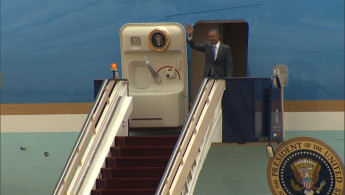9/11 bill 'damages relations' as Obama visits Saudi Arabia
The bipartisan bill, which has yet to reach the Senate floor where it is expected to be debated, caused anger in Riyadh in the days before Obama was set to meet Saudi officials on his official state visit to the region.
But Obama has already voiced his stern opposition to the bill, which could essentially strip international states of their sovereign immunity.
When asked Monday about the bill during an interview with CBS News, Obama said as much clearly: "Exactly, I'm opposed."
Saudi Arabia's involvement
Fifteen of the 19 hijackers involved in the 2001 attacks on New York and Washington were proven to be Saudi nationals, but the kingdom has never been formally implicated in the attacks that left more than 3,000 dead.
The Justice Against Sponsors of Terrorism Act would allow the families of those killed in the 9/11 attacks to sue the Saudi government, and any other government involved in an attack in future.
| Read more: Iraq's football team slides into Saudi-Iran tensions |
US Senator John Cornyn said Riyadh was over-reacting to a bill that did not specifically target the kingdom itself but covered all international governments.
"I don't understand their defensiveness," he said. "It's not directed at the Saudi government - unless there's something in those 28 pages that have been classified that they're worried about that we don't know about.
"I don't think we should let foreign countries dictate the domestic policy of the United States," Cornyn added.
Persistent allegations
In February, claims by Zacarias Moussaoui, dubbed the 20th 9/11 hijacker, suggested members of the Saudi royal family gave millions of dollars to al-Qaeda in the 1990s.
Although Saudi Arabia denied the allegations, the claims sparked a debate over the release of a classified 28-page section of the 9/11 Commission Report which has yet to be published. It was blocked at the instruction of then-President George W Bush, who was close to the Saudi royal family.
Although the 9/11 Commission found "no evidence that the Saudi government as an institution or senior Saudi officials individually funded the organization", the censored section is believed to shed light on the role of foreign governments in the attacks - a document many in the United States are keen to see made public.
Grudges among allies
Tensions between Saudi Arabia and its long-term ally, the United States, have also increased in recent months due to Obama's outreach towards the kingdom's regional rival, Iran.
Most prominently, a UN-US-EU-brokered nuclear deal which saw harsh sanctions lifted from the Islamic Republic caused a rift in an otherwise strong US-Saudi relationship.
The nuclear deal, dubbed the Joint Comprehensive Plan of Action (JCPOA), encouraged Saudi Arabia - as well as other GCC-member states - to each begin taking firm stances against Iran and its allies.
A show of force
In March, nearly 350,000 troops from across 20 nations in the Middle East, Africa and Asia took part in what is thought to be the largest ever peacetime military exercise undertaken in the Arabian Desert.
But the unprecedented troop movements, described by authorities as "the most important and largest in the region's history", suggested the kingdom was making a more assertive show of force against Iran, amid escalating tensions.
 |
Saudi Arabia continues to hold a grudge against the US for its soft-handed approach to both Assad and the Houthis in Yemen |  |
In recent weeks, Saudi Arabia, with backing from its Gulf allies, has acted against Tehran's perceived proxies - including exerting force on Lebanese authorities to halt Hizballah's activities in the region, cancelling a $4 billion deal to support Beirut's military.
Hizballah, a Shia political movement and armed guerrilla group that receives both monetary and military support from Iran, fights alongside Syrian President Bashar al-Assad, and has been accused of helping train rebels in Yemen in their fight against Saudi Arabia.
Likewise, Saudi Arabia continues to hold a grudge against the US for its soft-handed approach to both Assad and the Houthis in Yemen, where its coalition continues its attempt to reinstall President Abdrabbuh Mansur Hadi's government.
Despite this tension, both countries are working together as part of an international coalition fighting the Islamic State group in Syria and Iraq.
Obama has categorically rejected the passing of the bill - though Republican presidential candidate Senator Ted Cruz sponsored the legislation, and Democratic White House hopefuls Hillary Clinton and Senator Bernie Sanders said they support the bill.





 Follow the Middle East's top stories in English at The New Arab on Google News
Follow the Middle East's top stories in English at The New Arab on Google News


